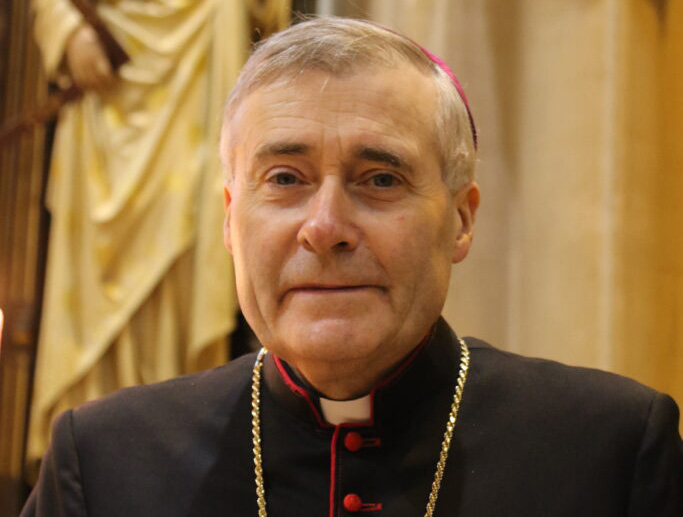Christmas can never be cancelled even in the most unfavourable of conditions, the Bishop of Shrewsbury said in his Christmas homily.
During midnight Mass at Shrewsbury Cathedral, the Rt Rev. Mark Davies acknowledged that it is “easy to focus on the dark shadows” of 2020.
But he reminded the congregation that Christmas leads the faithful back to the “point of light” that shines in all our darkness, the child born for us all.
“Christmas can never be cancelled,” Bishop Davies said, “for its light is not dependent on favourable conditions for even the darkness makes its light shine the more brightly”.
Besides the coronavirus pandemic, the Bishop also lamented attempts over the passing year to extend abortion and the renewed efforts to legalise assisted suicide as assaults upon the sanctity of human life.
He reminded the faithful that the modern nursing and medical profession was inspired by Christian belief in the value and inviolability of innocent human life and for the care of the weakest and most vulnerable in society.
The dedicated service and self-sacrifice shown by medical professionals in helping the victims of Covid-19 stood in a stark contrast to the “culture of death and despair,” the Bishop said.
He encouraged people either attending the Christmas Mass in person or viewing by live-stream to heed the words of Pope Francis in his Apostolic Letter, Patris Corde, of December 8, and to share with St Joseph the responsibility for “every poor, needy, suffering or dying person, every stranger, every prisoner, every infirm person” in whom the Child Jesus can be recognised.
Also echoing the hopes of Pope Francis, the Bishop said that “a new vision of fraternity and social friendship” which recognises how all the lives of all people are bound together is the antidote to “present-day attempts to eliminate or ignore others”.
“This is surely a happy lesson to be drawn from the trauma of the past year,” the Bishop said.
Bishop Davies said: “At the cradle of Bethlehem, we have learnt to value the life and dignity of every human being, especially the weakest and most vulnerable. The recognition of the sanctity of human life and the cherishing of the frailest – both notions utterly unthinkable to the ancient mind – would become the light which forged our civilisation; the vision, which first inspired our medical and nursing professions and has guided our best efforts in response to the recent pandemic.
“For we heard the voice of the same Child of Bethlehem say, ‘Whatever you do to the least of my brothers and sisters you do to me’. And we now see the stark contrast between a culture of death and despair, which readily discards human life, and that spirit of charity and self-giving service Christ’s coming inspired: a contrast between darkness and light.”
He said: “How precarious Christian civilisation can appear in the face of an ever-growing assault upon the value of human life whether in the extension of the legalised killing of the unborn; or in the increasing threat to the elderly and vulnerable by euthanasia under the guise of ‘assisted suicide’.”
The bishop added: “Amid every lengthening shadow, may we never lose the light of the Child who was born for us, who allows us to glimpse who we really are and discover our deepest identity as children of God. At this Christmas of 2020 and in the face of the challenges of a New Year to come, may we return to the light which first dawned in Bethlehem, the same light which shines for us at every ‘Christ’s Mass’.”

